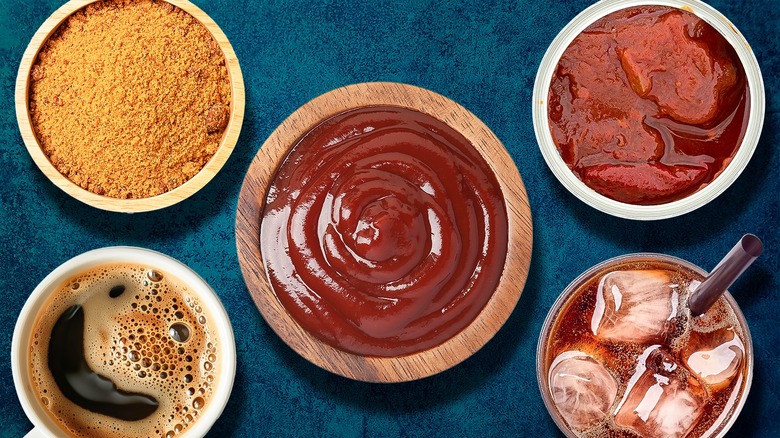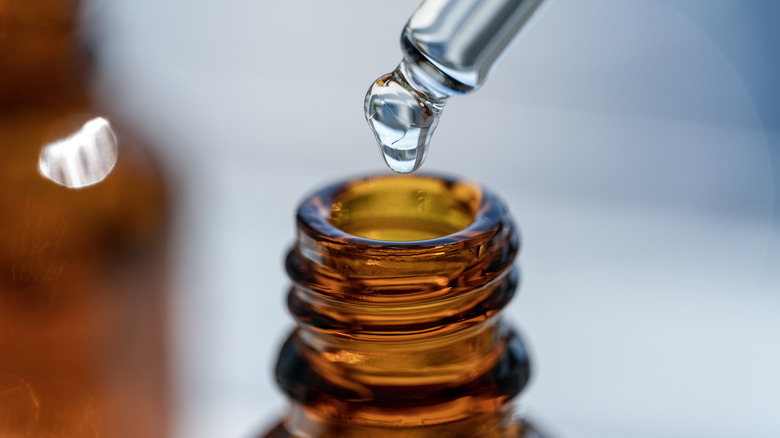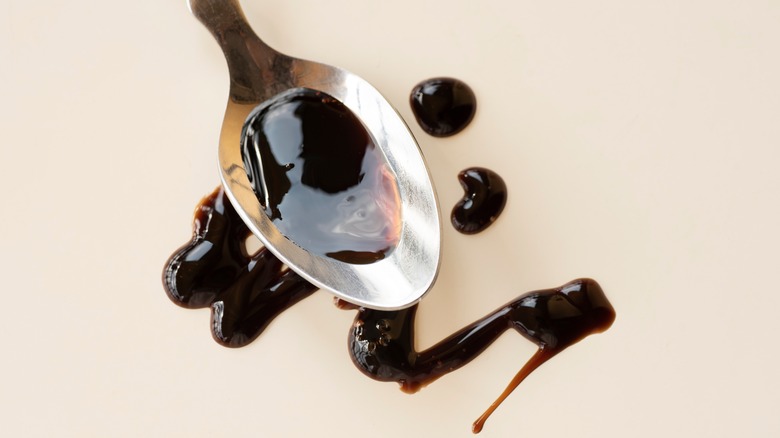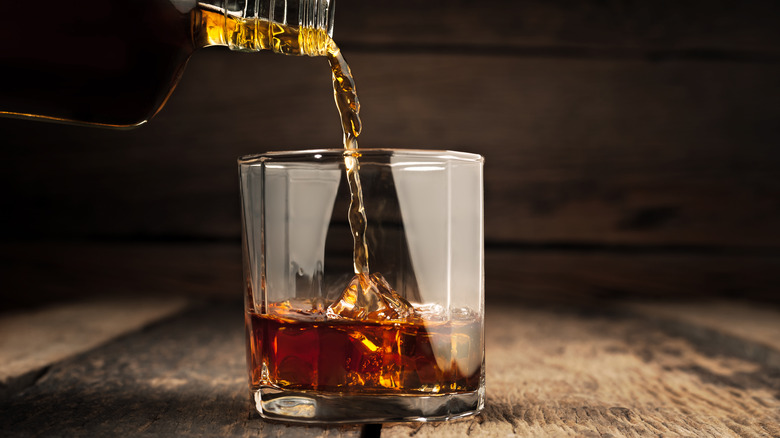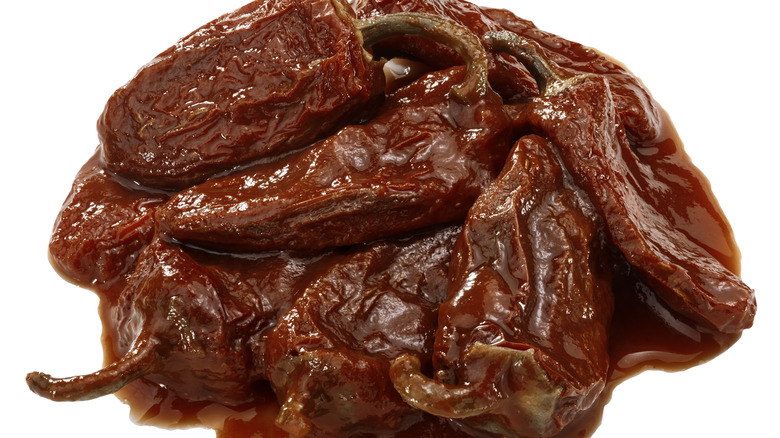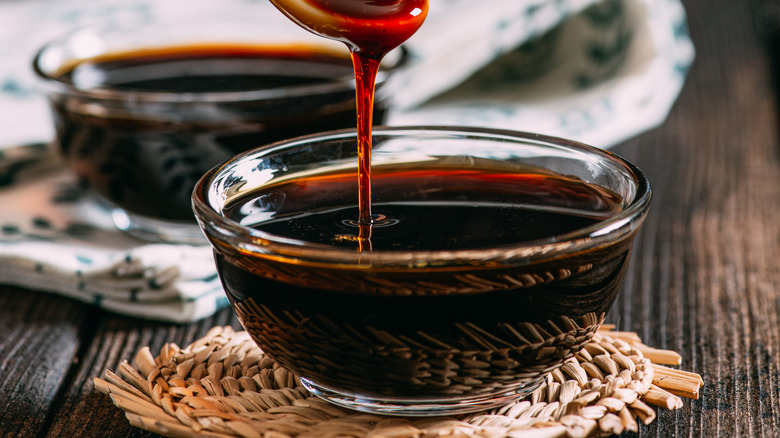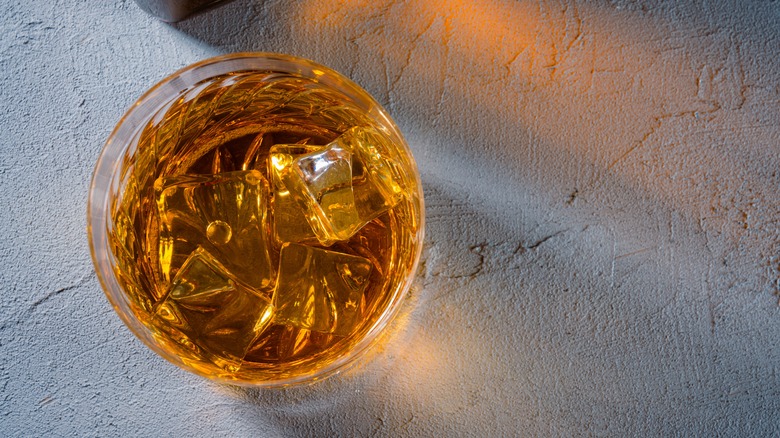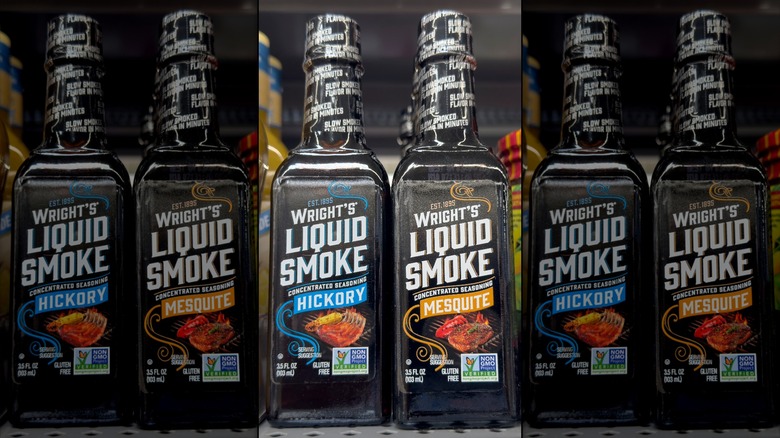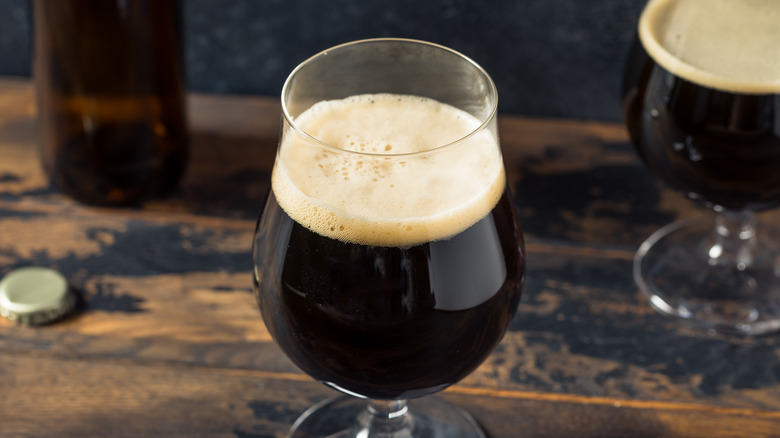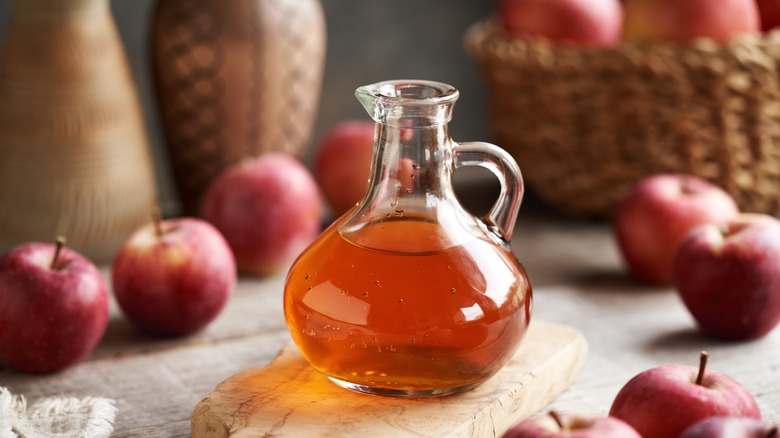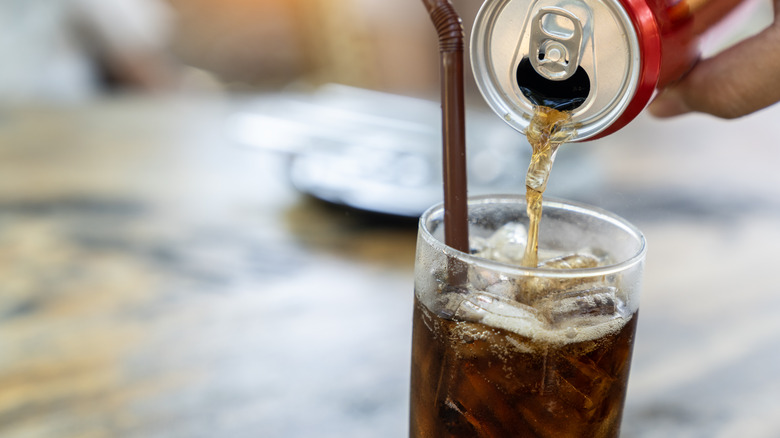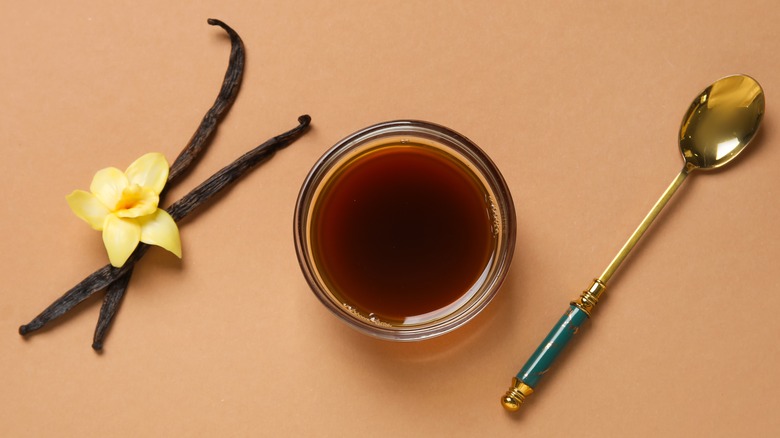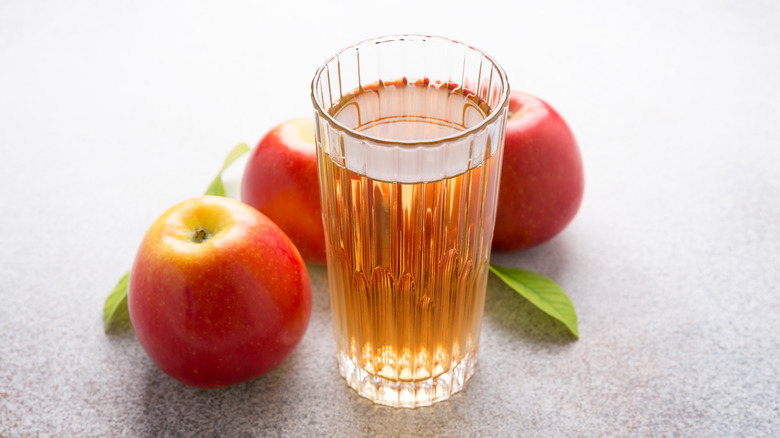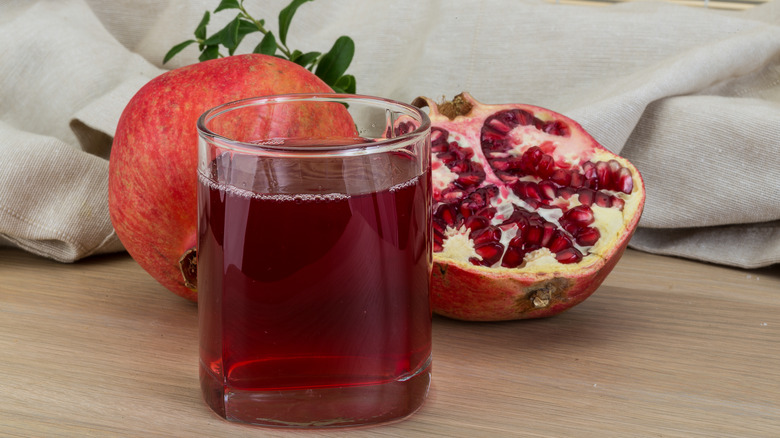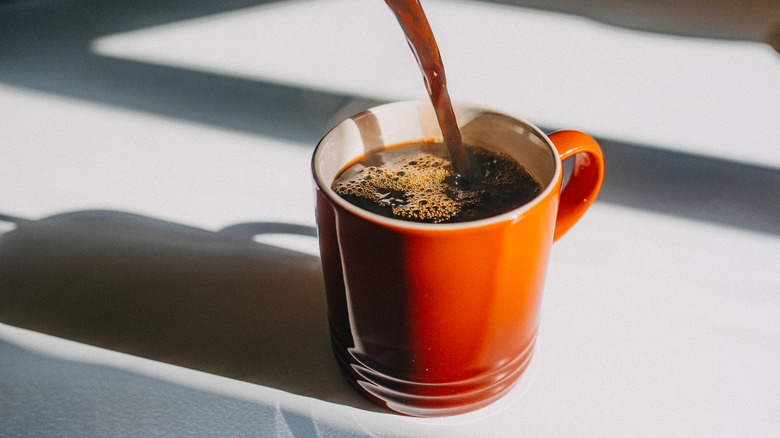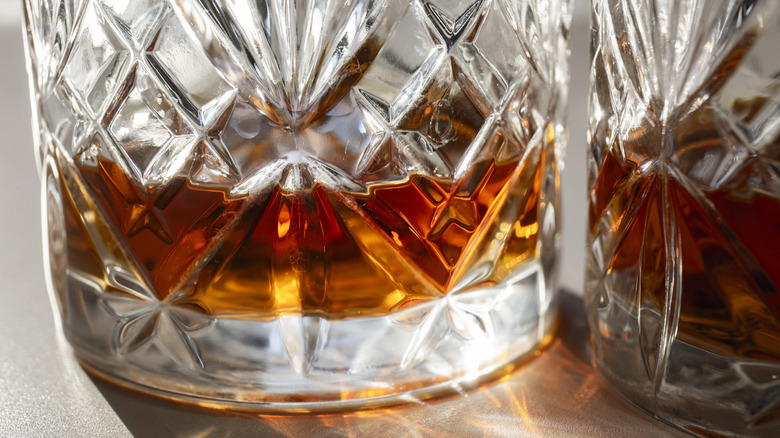The 15 Best Substitutes For Bourbon In Barbecue Sauce
We may receive a commission on purchases made from links.
Barbeque sauce is among the most popular sauces from around the world, and a bourbon-infused one offers a special flavor profile. Indeed, this spirit brings complex flavor, acidity, and depth to anything it touches, but there are many bourbon substitutes you can use for cooking. So, if you don't have that specific liquor on hand, aren't fond of the taste, or are looking for an alcohol-free option, you may find yourself searching for bourbon alternatives to use in your BBQ sauce.
When deciding on your substitute, you first have to identify what bourbon component you're trying to replicate, whether that's the alcohol's warming flavors or astringent burn. Once you understand what characteristic you're going for, it's time to pick your alternative ingredients. Combining certain ingredients can even further enhance your barbecue sauce.
While we have a few ideas of our own for making your bourbon-free homemade condiment a hit at mealtime, we also spoke with knowledgeable culinary experts to help us put together a list of the best replacements: James Callery, head chef at Cross Keys; Ben Wenzel, chef and general manager of River Stone Chophouse; and Rasheed Philips, BBQ connoisseur and founder of Grill & Chill Fest. To ensure you create the best barbecue sauce, we'll share insights on why each element makes a good bourbon alternative, what it brings to the resulting condiment, and how to best pair each one.
1. Bourbon extract
In the world of extracts, this one may not be as popular as vanilla or almond, but it's a solid option when it comes to bourbon alternatives. Ideally, your bourbon extract is made from bourbon whiskey, so it can easily replicate the flavor but in a concentrated form. We should also clarify that we are not referring to bourbon vanilla extract (which is a type of vanilla originating in Madagascar and, contrary to the name, doesn't actually include bourbon).
While a batch of bourbon BBQ sauce may require ¼ cup of the liquor, in this case, you'll only require one or two teaspoons of extract. It's ideal when you don't want to impact the viscosity of your sauce but want to replicate that bourbon flavor more authentically. Try this barbecue sauce with chicken, pork, beef, or your choice of meat. It has similar qualities as the spirit, and since you only need a small amount, you can use it for other cooking and baking adventures.
2. Balsamic vinegar
Balsamic vinegar is a marvelously complex addition to many recipes, and barbeque sauce is no exception. It's rich, sweet, tart, and sometimes oaky with an aromatic quality that makes it a great bourbon replacement when you want to imitate the alcohol's layered flavors. Hitting on these similar flavors in a distinct way, this is why you'll often see balsamic vinegar in BBQ sauces across the board.
"Incorporate it in the middle of the cooking process to prevent it from overpowering the sauce, and let it cook down until it thickens a bit for a more bourbon-like consistency," Ben Wenzel recommends. Let the fruity, tangy notes shine when you want a brighter BBQ sauce. But since balsamic vinegar has a concentrated taste, it's best to only pour in a small amount to give your sauce that extra zing. This ingredient can also provide a rich, dark color to your sauce, similarly to bourbon. The resulting balsamic BBQ sauce tastes fantastic with many veggies and proteins, particularly if you're grilling or barbequing them.
3. Rum or brandy
If you're seeking another alcohol to use in your BBQ sauce instead of bourbon, either brandy or rum are solid options. Both have a similar color to bourbon to provide the sauce with its signature hue. Rum can have notes of vanilla, bourbon, and spice with a strong aroma (and dark rum can be even more potent), while brandy may be fruity, a tad sweet, and oaky. Their rich flavors make either one a fantastic alternative to bourbon for a similarly fresh and smooth-tasting take on barbecue sauce.
Pick between rum and brandy depending on which notes you want to pull into your tasty condiment. These liquors can be versatile and bring their individual elements to complement the sweetness without completely taking over the barbecue sauce. If you're using sweeter alcohol like a sweet rum, you may want to reduce any added sugar to balance the overall flavor, such as a ½ cup of sugar compared to one cup. Try this delicious BBQ sauce with anything, from ribs to tempeh.
4. Chipotle peppers in adobo sauce
Since barbeque sauce has sweet elements, whether you use brown sugar, molasses, maple syrup, or something else, chipotle peppers in adobe sauce can bring a drool-worthy balance. It has heat from the chipotle peppers (which are dried, smoked jalapeños) and a bit of tang from the vinegar and tomato paste. These notes make a top substitute for bourbon's depth of flavors. As an added bonus, this delicious option is also convenient, as it contains multiple ingredients in one container. So, you'll get a good bang for your buck since you don't have to separately mix and prepare them to get that smoky, spicy taste.
Simply chop the peppers or puree them in a blender for smoother pieces and even distribution in your sauce. After all, BBQ sauce isn't known for being particularly chunky. If you want an even smoother sauce, put the finished product in a sieve to filter out any remaining pieces. Your sauce will be phenomenal and have a similar, dark reddish hue to your standard barbeque sauce.
Chipotle peppers in adobe sauce are frequently used to season meats. So, you may apply the same theory by using this BBQ sauce for your favorite proteins.
5. Brown sugar or molasses
When you sip on bourbon, you may notice its caramel, butterscotch, or smoky notes. If you want to tap into these flavors, molasses or brown sugar can replicate the taste while also capturing the drink's dark hue. Sweet, smoky, and slightly bitter, molasses has a specific full-bodied flavor that you may associate with gingerbread cookies — and adding complexity to BBQ sauce is just one of many creative ways to use this ingredient.
Rasheed Philips says, "This substitute works exceptionally well in barbecue sauces intended for grilling robust meats like beef ribs or pork shoulder, as it complements the strong flavors of the meat." Since brown sugar has molasses in it, it only makes sense that you can toggle between the two. While brown sugar is sweeter and more muted compared to the thick liquid, James Callery explains that it adds a sweet and smoky taste to barbecue sauce in the same way that bourbon does.
But you'll have to keep the texture in mind, as brown sugar can make your BBQ sauce thicker, Callery notes. When using either molasses or brown sugar, balance the sweetness and thickness with other liquids in the sauce, such as tart apple cider vinegar, umami Worcestershire sauce, or sweet but acidic ketchup. Or, you can simply enjoy a thickened sauce.
6. Whiskey
Bourbon is a type of whiskey, so using the latter is one of the closest substitutes to add to BBQ sauce that you'll find. The difference between bourbon and whiskey boils down to the mash bill, which is the types of grain used and how much of each ingredient makes up the drink. While bourbon has to be at least 51% corn with other ingredients like barley and rye, whiskey may vary depending on what kind you're using, such as a rye whiskey being 51% rye. These components can switch up the taste, but generally, you can expect whiskeys to have a warm, sweet taste with a hint of spices.
With whiskey sharing similar qualities and colors to what you'd expect from bourbon, you don't have to do anything special for this swap. Whether you opt for rye, Irish, Tennessee, or something else is up to you, but use somewhere between a ¼ to ½ cup of your desired whiskey based on your preferred potency. This delicious iteration of BBQ sauce can be used for anything from portobello burgers to chicken wings.
7. Liquid smoke
You should always have liquid smoke in the pantry for when you want to bring that smoky aroma and taste to your foods without physically having to char or grill something. You don't have to use a ton to get results either, so it's an economical addition to your kitchen. For our purposes, this flavorsome ingredient is an alcohol-free way to bring the smoky quality you may have come to enjoy from an oak barrel aged bourbon to your BBQ sauce. However, since it's solely smoky in taste, you'll want to harness some sweetness from other ingredients.
Ben Wenzel recommends combining liquid smoke with apple juice. In a similar fashion to bourbon, he explains, "The result is a well-rounded, slightly smoky sweetness that enhances the sauce's flavor." Pour the liquid smoke and apple juice in with the rest of the ingredients and give it time to reduce for maximum flavor, Wenzel adds. This BBQ sauce works perfectly for any type of smoked meat or roasted vegetable to draw in that woodsy taste.
8. Dark beer
We're used to seeing beers in batters and breads, but a dark beer can also bring its distinctive taste to replace bourbon in BBQ sauce. Working with beer not only contributes a nice hue but also rich flavors. And by dark beer, we don't mean that it has to be pitch black; rather, you simply don't want a light-colored one like a hazy IPA, which may be too hoppy and bitter and can quickly overthrow the sauce. There are plenty of darker brews to pick from, whether you go for a caramel-tasting amber ale or a spiced wintery beer. A bourbon-aged beer would make an epic choice, as well, given that we're on the hunt for the best substitutes for bourbon in barbecue sauce. Meanwhile, a stout is smooth with hints of coffee and molasses.
You may use anywhere from eight to 12 ounces of the brew, based on how big a batch you're making and the beer's specific flavor profile. Since we're working with a decent amount of liquid, add it in the beginning and allow it to simmer and reduce before mixing in the rest of your BBQ sauce's ingredients.
9. Apple cider vinegar
This ingredient is made from fermented apples, sugar, and yeast, which creates a tangy, pungent but subtly sweet apple-flavored liquid. Bringing acidity and mild sweetness with the same tingle you get from alcohol, apple cider vinegar is a top alcohol-free substitute for cooking bourbon. But you'll want to complement it with additional sweetness in your BBQ sauce, or else it's quite potent. Rasheed Philips recommends integrating peach or apricot nectar for a fruity brightness, explaining, "These nectars add sweetness and a mild acidity, which can help balance the richness of the sauce."
Meanwhile, Ben Wenzel suggests a blend of apple cider vinegar and brown sugar to help bring the barbecue sauce together without booze. "The apple cider vinegar gives it a slight acidic tang, similar to bourbon, while the brown sugar mimics the caramelized sweetness," he says. "Add this mix early on while simmering the sauce so the sugar can dissolve and the vinegar's acidity mellows out." Try these tasty BBQ sauces with your proteins of choice. Each pairs nicely with lighter meats like chicken or pork dishes, offering a welcome punch.
10. Cola or root beer
Cola is frequently used as a meat marinade and tenderizer, so it's a delectable way to bring flavor to barbeque sauce while helping the protein remain supple. Rasheed Philips says that cola or root beer bring their sugar content, tang, and complex flavors that emulate the depth and sweetness supplied by bourbon. Cola can have caramel, vanilla, or cinnamon notes, while root beer has a spiced taste with hints of ginger, licorice, and wintergreen. Even a beverage like Dr. Pepper works. There's flexibility on the dark soda you use, so if you're loyal to one over another, simply pick your favorite. The effervescence fades after reducing so you don't have to worry about that aspect.
"Use these sodas in barbecue sauces for grilling or slow-cooking meats like brisket or pulled pork, where their flavors can infuse over long cooking periods," says Philips. But you could just as easily slather this sauce on meatloaf or make barbeque chicken for a tasty family meal.
11. Vanilla extract
Other top subs like cola or rum have hints of vanilla, so this tip is all about going straight to the source. Vanilla is a popular bourbon replacement in cooking because of its floral, sweet, and creamy notes. But you'll want to use a pure extract, as the artificial flavors won't offer the same taste or similar potency. Although you're using it in small quantities, vanilla extract also has a bite from its alcohol by volume content (which can be as high as 35%) — which marks another bourbon-adjacent aspect.
Use vanilla extract as a bourbon swap in bourbon-chile barbeque sauce for a balanced condiment to marinate or baste your favorite proteins or vegetables. You'll need about a teaspoon of the stuff to get the desired taste, specifically when using a good vanilla. Pair other elements with the vanilla to offer a well-rounded flavor. A bit of liquid smoke alongside the vanilla can make a sweet, smoky bourbon BBQ sauce alternative; or, pair the extract with rum for a mouthwatering, fragrant combination.
12. Apple juice
James Callery says, "If you want to add acidity to your barbecue sauce, fruit juice is the perfect option." For example, even unsweetened apple juice will still add a sweet taste thanks to all the natural sugars in the fruit. Unlike other bourbon alternatives that are very sour with a mouth-puckering astringency (like apple cider vinegar), this has a more prominent fruity undertone. But to mimic the taste of bourbon, you don't want the juice to act alone; round out the flavors with spicy, smoky, or tangy additions to best replicate the alcohol's depth.
In addition to including that aforementioned liquid smoke, you could also bring smokiness through the nuanced umami taste of Worcestershire sauce. Assemble a more apple-forward interpretation by including applesauce, which pairs marvelously with pulled pork or pork ribs. The addition of apple cider vinegar can give the apple juice a tanginess, bringing symmetry to the sauce; or, swap apple juice for apple cider for a spiced version that can draw from the bourbon's notes of cinnamon and cloves. Whichever pairing you choose, fruit juice is a fantastic bourbon substitute when you want to create a more delicate sauce.
13. Pomegranate juice
Pomegranate juice is fruity and sweet yet acerbic, so it has a complexity that makes it a memorable but fitting bourbon alternative, according to Ben Wenzel. You can use fresh pomegranate that you squeeze the juice out of (this is delicious but messy), or you may opt for unsweetened 100% pomegranate juice from the store (any added ingredients, such as sugar or corn syrup, can throw off the taste). Wenzel explains, "The tartness helps cut through the richness of the meats and balances the sweetness of the sauce." It's similar to adding vinegar or lime juice.
Since this option requires a couple cups of juice, mix your ingredients and let it simmer until the sauce reduces and has more concentrated flavors. The color of this sauce has a striking dark-red hue that you wouldn't get from ketchup alone. Bring a bit of smoke and spice by also including chipotle peppers in adobo for a delicious bourbon-free barbeque sauce that hits different parts of your taste buds.
Enjoy this BBQ sauce with shrimp, grilled chicken, or steak. It brings a fresh spin you might not expect but works beautifully with the other ingredients for a nice bourbon substitute.
14. Coffee or espresso
"Believe it or not, coffee can be a great substitute for bourbon in BBQ sauce," says Ben Wenzel. No, we're not talking about milky lattes or whimsical concoctions with syrups. A strong cup of black coffee (or even espresso) brings a hint of intensity and a light roasted bitterness to balance the sauce's sweetness. Your particular type of coffee beans can furnish their own notes, like the smoky, caramel taste of a continental roast or smoky and bittersweet French roast. So, you may want to pick accordingly based on what you want the beverage to contribute to the barbeque sauce.
Add the coffee during the simmering stage, Wenzel suggests, so the liquid has time to reduce while providing an umami-like quality to the sauce. Coffee also offers its rich, dark hues to create a robust, smoky condiment that you'll love on meat. Rasheed Philips notes, "Coffee-infused barbecue sauce is excellent for beef, particularly steaks and ribs, where the bold flavor complements the natural taste of the meat."
15. Non-alcoholic bourbon
For the most direct bourbon substitute, you may want to consider a non-alcohol bourbon. Although you may notice some nuanced taste differences based on the brand you purchase, these are specifically created to have a generally similar look and vanilla, caramel, and oaky flavor but without the burn (or alcohol content) you normally expect from spirits. Others may also have a clove or a touch of fruit or vegetable juice to give it a tinge of color. These may be available at your local stores or wine shops (usually in a designated non-alcoholic section), but you can conveniently locate them online — including the award-winning Spiritless Kentucky 74 Non-Alcoholic Bourbon Whiskey Spirit and Lyre's American Malt Non-Alcoholic Spirit – Bourbon Style options on Amazon.
Since this product is meant to replicate the flavor of bourbon, you don't have to add other ingredients to provide a similar depth. You can simply follow your favorite bourbon BBQ sauce recipe and swap the non-alcoholic one without doing math equations on how much you need to put in. Use this in any dish where you'd utilize bourbon barbeque sauce. This is a top contender if you want a seamless substitution.
